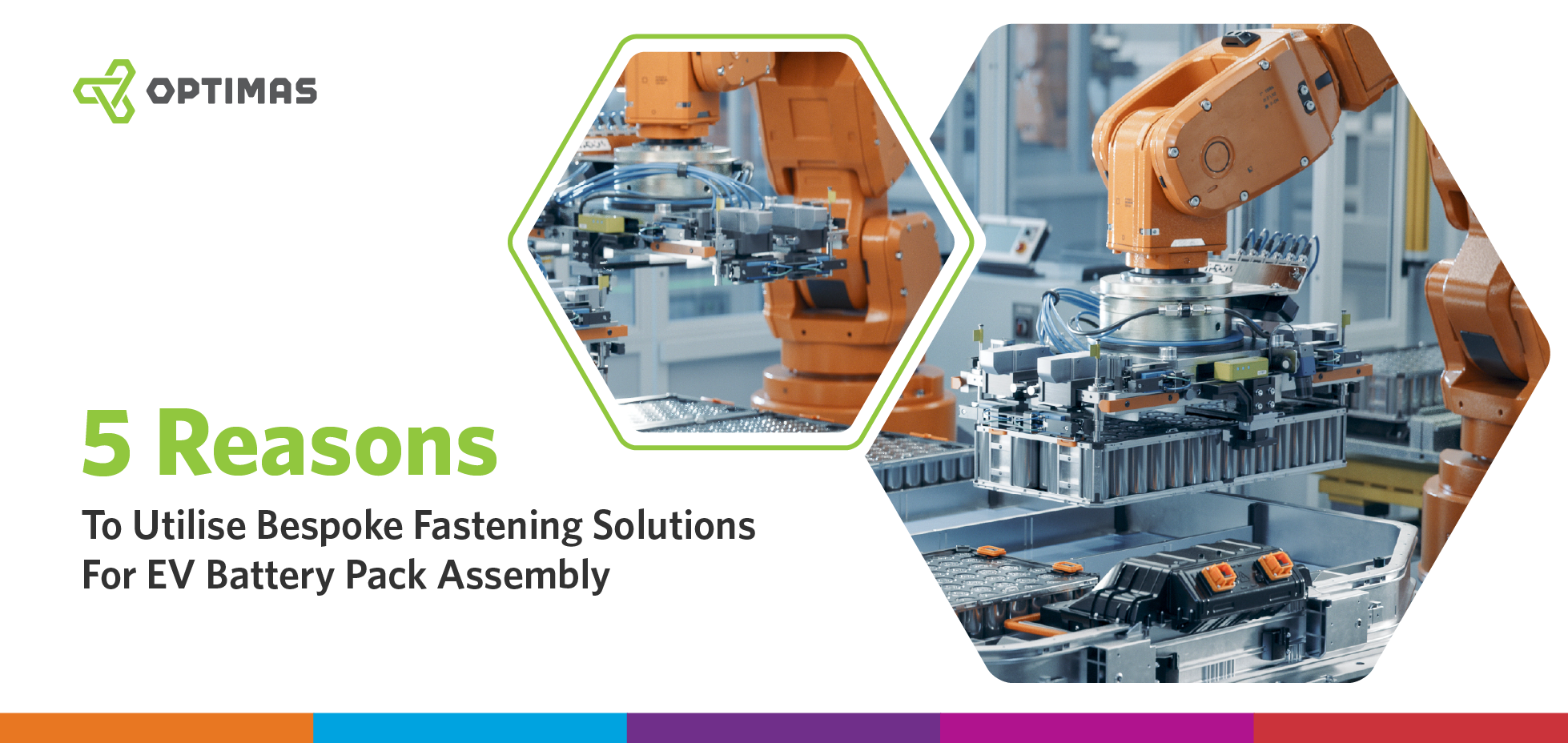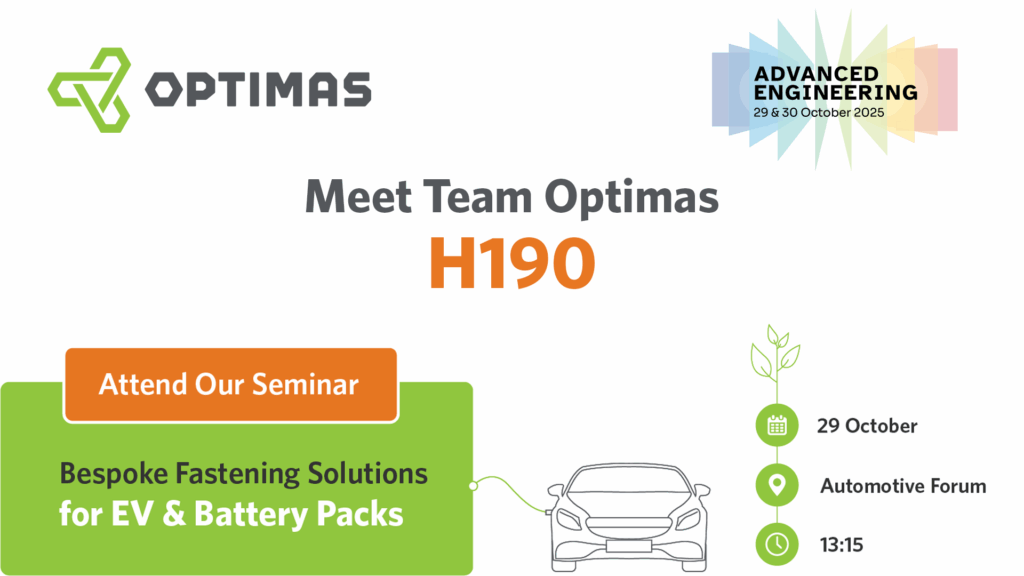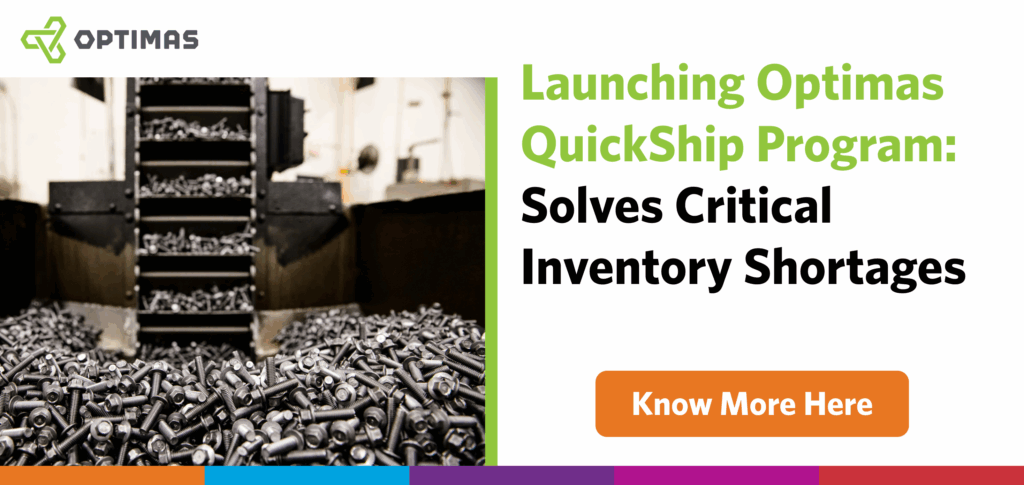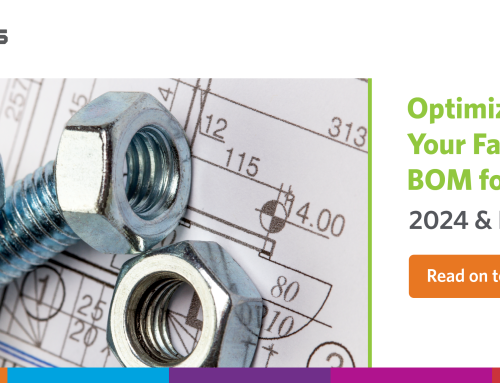
5 Reasons to Utilize Bespoke Fastening Solutions for EV Battery Pack Assembly
As a global manufacturer and distributor of fasteners, C-class components and engineered parts, Optimas has a wealth of experience in supporting OEMs with bespoke technical and operational solutions to help them find greater value in their fastener usage.
From the 29th to the 30th of October, our fastener experts will be on stand H190 at the Advanced Engineering 2025 exhibition, where they will speak to attendees about how they can minimize risk to their supply chain, reduce their total cost of ownership and explain how bespoke engineering solutions can uncover cost savings and reveal product improvements.
We’ll also hold a seminar at the Automotive Forum on Wednesday, 29 October, at 13:15 to discuss how incorporating bespoke fastening solutions for electric vehicle (EV) battery packs can improve performance, assembly efficiency and operating financials.
Registration for the exhibition is free and you can do so here. We look forward to seeing you soon!
Engineered fastening solutions can be pivotal for improving products and unlocking efficiencies across many industries. Here are five key points that identify how these solutions are supporting production specifically for EV battery pack assembly.
1. Enhanced Structural Integrity
Engineered fasteners that incorporate high-strength materials and vibration-resistant locking features ensure the parts maintain clamp load under crash forces, high-frequency motor vibrations and thermal stress cycles. Bespoke variants of high-strength bolts with serrated flanges or hardened studs with prevailing torque nuts or encapsulated local coating patches could be selected to prevent loosening under sustained vibration. In addition, tailored fastening solutions have been developed for critical applications such as busbar joints, ensuring secure connections and reliable electrical performance.
These solutions ensure the overall battery pack remains secure and the vehicle’s safety system remains uncompromised.
2. Optimizing for Lightweighting
Reducing weight is a direct way to improve EV range and efficiency. Custom fasteners for battery packs are increasingly made from 6000-series and 7000-series aluminum to cut weight without compromising tensile strength. Furthermore, downsizing fastener geometries while leveraging higher-strength materials allow further weight reduction without the loss of performance. Using these bespoke parts can support energy efficiency targets and allow OEMs to meet aggressive vehicle weight goals without sacrificing durability.
Get in touch with a fastener expert to provide you with engineering support on your EV project.
3. Ensuring Environmental Protection
Battery packs must be sealed against water, dust and road contaminants to protect sensitive cells and electronics, whilst also preventing any byproducts of chemical reactions from escaping the pack and polluting the environment. Fasteners can be integrated with molded silicone or EPDM O-rings under the head to achieve IP67, the required dust protection and water resistance standards. Utilizing these bespoke solutions reduces the risk of leaks over the vehicle’s lifetime, a crucial aspect of EV battery pack performance.
4. Streamline Manufacturing
Bespoke fasteners for EV battery pack assembly are designed to perform multiple functions at once, reducing part count and simplifying installation. For example, a captive washer flange bolt can help speed assembly in comparison to standard components, because it can align the part, prevent rotation and lock in place. Self-aligning studs with pilot points are also useful as they guide heavy pack assemblies into position during automated assembly. By combining washers, locking mechanisms, and alignment features into a single component, OEMs can cut assembly time, reduce errors and improve throughput. These efficiencies translate directly into lower production costs and faster time-to-market.
5. Supporting Sustainability and Serviceability
As EV batteries reach the end of their service life, the ability to disassemble them efficiently becomes critical for recycling and reuse. Bespoke fastening solutions can incorporate designs allowing for the quick removal of batteries that prevent damage to surrounding components. Reversible thread-locking compounds enable bolts to be reused rather than scrapped. By making it easier to replace modules, it supports a circular economy but also helps manufacturers meet evolving sustainability regulations.
Our onsite team at Advanced Engineering will also provide attendees the opportunity to explore Optimas’ innovative BOM management and design engineering tool, OptiSpec®. OptiSpec® is a cloud-based application which helps users prevent part proliferation, encourage part rationalization and implement rapid prototyping.
In addition to providing technical support, we will demonstrate how you can minimize supply chain risk through our global sourcing leverage and localized support and explain how to reduce the total cost of ownership across fastener and C-class component usage.
If you have any questions regarding engineering support for your EV project or any other queries, please contact us.







